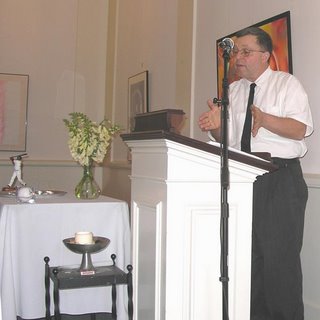 Worship on August 6th was led by Peter Gray, a member of the faculty of Boston College.
Worship on August 6th was led by Peter Gray, a member of the faculty of Boston College.
Sacred Play.
Pastoral Reflection
Diane and I spent 11 days at the end of July backpacking on the Long Trail in Vermont's Green Mountains. So I thought I would start this morning with a little story about a Unitarian mountain climber.
This guy is hiking along a mountain ridge, loses his footing, and slips off the edge of a cliff, but he grabs onto a vine to keep from falling into the chasm. There he is, hanging over the cliff, holding on to the vine. In fear and desperation, he looks up toward heaven and cries out, " Is there anyone up there who can save me?"
A booming voice responds:
MY SON, ALL YOU NEED TO DO IS SHOW YOUR FAITH BY LETTING GO OF THE VINE AND I WILL SAVE YOU.
The man looks down into the chasm.Then he looks up again and cries out, "Is there anyone else up there who can save me?"
I'll come back to this story near the end of the service. Right now, though, I want to tell you about Diane's & my backpacking trip.
This was the first backpacking that I had ever done in my life and the first that Diane had done in the past 20 years. We hiked up and down mountains for about 100 miles, through heat and Rainstorms. We each carried a quarter of our own weight on our backs. We scrambled up some steep rocks and we slogged through lots of mud. We ate only dehydrated foods and drank only water that we filtered from mountain streams.
We didn't fall over any cliffs, but we suffered in just about every other way you can imagine. We suffered bites from mosquitoes, wasps, deer flies, and black flies. We suffered from blisters on our feet and shoulders and from bruises that came from a couple of falls. We, including me with my arthritis, slept on a thin mat on the hard ground in a tent.
Physically, this was probably the hardest thing I' I've ever done in my life. Diane says for her it was the hardest thing since labor. If it had been a job, we would have quit. No pay would be enough. And yet, there we were, spending our precious two weeks of vacation time out there on the trail. And we didn't regret it. In fact, we're already making plans for doing another 100 miles of the trail next summer.
Why?
Why did we choose to do this?
And why are we likely to do it again next year?
I don't have a good answer to that. All I can say is that for some reason, for us, this was an extraordinarily engaging form of play.
An activity is play if it is self-chosen; done for its own sake rather than for some goal outside of itself; has its own rules or structure, which are different from those of ordinary life; and has an imaginative or "pretend" component to it.
Our backpacking trip met all of those criteria. We did not choose to do this because we thought it might in some way be good for us; in fact we were a little concerned that it might be bad for us.
We did it, I think, to experience a different world from that of our serious lives. Out there on the trail, Diane was no longer a physician; I was no longer a research psychologist and writer. We were mountaineers. We were in a play world. We even went by different names.
All backpackers on the Long Trail and Appalachian Trail take on trail names and know each other only by those names. Diane took the name Mighty Mouse; and if you had seen her hauling her huge pack up and down mountains you would have to agree that the name was perfect for her. Sometimes when I was tired I would grab figuratively onto her cape and she would pull me along, flying through the woods.
I took the name Loon , which I like for both of its meanings-- a bird that seeks pristine waters and a slightly crazy human being.
In play, people do things that are harder than what they do in real life. In play, people are stronger, are able to tolerate more pain than in real life. Children in play think at a higher level, read better, do everything better, than they do when not playing.
To borrow a phrase from the famous Russian psychologist Lev Vygotsky, in play each person is a head taller than in real life.
Sermon
In my real life I have for some time been a student of children's play. My academic specialty is evolutionary psychology, which means that I bring a Darwinian perspective to the attempt to make sense of human behavior.
Play is a universal aspect of human nature. Indeed, it is universal not just to humans but to essentially all mammals. Play is the means by which young mammals practice the skills they need in order to survive. In most mammals play is restricted to the young; but in humans it persists to some degree throughout our lives. That is because we, unlike most mammals, never quite grow up. We continue, throughout our lives, to learn and adapt to new circumstances.
I'm convinced that the instincts for play and exploration in children came about, evolutionarily, to serve the purposes of education.
During the great bulk of our evolutionary history, we were hunter-gatherers. As part of my research I have surveyed child development in modern-day hunter-gatherer cultures and have found that in every one of them that has ever been studied children and young adolescents are free to play and explore, on there own, essentially all day long, every day, and through those activities they acquire the skills and knowledge they need to become successful adults. An assumption in all such cultures is that children teach themselves, through their own play and exploration.
I have also studied play at a radically alternative school in Framingham, and that work has shown me that-- in a safe, age-mixed, democratic setting, where the skills and values of the culture are represented-- the play drive and curiosity drive are sufficient for the purpose of education even in our own culture. Coercive education is unnecessary. I'm not going to talk about those studies or try to convince you of that thesis today. I would love to do so, however, in some other context, such as a Religion in Our Times meeting, if there is interest.
What I intend to do here, now, is more modest. I want to talk about what play is as a natural phenomenon, how it contributes to our experience as human beings, and how it may contribute to our philosophical and religious thinking.
Most research on play is with children, so I will start with children's play. Children all over the world, in every culture, play when they have the opportunity to do so. The specifics of play vary from culture to culture. For example, in hunter-gatherer cultures children play with bows and arrows, and in our culture they play with computers. But, at a more abstract level, the basic forms of play are universal. Consistent with the idea that the play instinct evolved to serve educative functions, the basic forms of play match closely with the categories of skills that people everywhere must learn.
- There is rough and tumble play -- play chasing and play fighting. This is a kind of play that we share with other mammals, and it helps us develop strong bodies and stamina. Children do not run laps or lift weights to build their bodies. They run around playing monsters and other chase games until their sides ache from both laughter and exhaustion.
- There is constructive play -- the playful building of things. Children everywhere play at building the kinds of things that are important in their society-- huts or houses, bows and arrows or computer programs, secret codes, sometimes poems. We are the species that survives by building things; so it is not surprising that we have an instinct to play at building things as children.
- There is pretend play and its close cousin, sociodramatic play. Children everywhere create make-believe worlds in their play. They create dramatic situations and play out roles. Such play exercises a number of extraordinary human abilities: the ability to imagine various possibilities and carry them out in one 's head; the ability to think about and plan for the future; the ability to get along with others; the ability to control one's own behavior in accordance with mental concepts about how one should behave if one is a certain kind of person.
- Finally, there are formal games with explicit rules, which are passed along from generation to generation of players. Play of this sort exercises, among other things, the capacity to understand and follow explicit rules, a skill that is required for full adult participation in any society
Those are the major types of play, but what exactly is play?
Like other psychological concepts, play is a fuzzy concept. Some activities are fully and clearly play, while others are just partly play. Those of us who study play generally consider an activity to be playful to the degree that it to has the following four characteristics:
1. Play is intrinsically motivated . Another way of saying this is that, in play, the means are more important than the ends. A child playfully building a sand castle is more interested in the process of building the castle than in having the castle. If an adult came along and said, " You can stop all your effort now, I'll build the castle for you," the child would be disappointed. Similarly, when products that children create are evaluated and judged by adults, even when judged positively, play is often ruined. The child's focus changes naturally to the end result-- that of pleasing the adult-- and the activity is no longer play. If Diane and I had done our backpacking trip primarily because we thought it would be good for us in some way-- maybe by building our bodies or causing us to lose weight-- then that activity would not have been play. Our focus would have been on the end, and we would have hated the process. Play may do good things for us -- indeed, my thesis as an evolutionary psychologist is that the play instinct evolved because play does do good things for us-- but we don' t consciously play for those ends. Indeed, it is the very fact that our focus is on the means and not on the ends that makes play so valuable as a mode of practice and learning. Because the ends are unimportant in play, we feel free to experiment with the means, and it is through that experimentation that we learn and grow.
2. Play is self-chosen and self-directed. Play is what one wants to do as opposed to what one is obliged to do. It is optional, not required. That is perhaps the most basic ingredient of most people's common-sense understanding of play. In one research study, kindergartners identified as "play" only those activities that were voluntary-- the things they did at recess-- and as "work" all of the activities that were part of the school curriculum, including required activities that were designed to be enjoyable, such as finger-painting, running relay races, and listening to stories. The joy of play is the ecstatic feeling of liberty. Players are free agents, not pawns in someone else's game. They play by rules, but the rules are those that they themselves have agreed up on. One player may for a period emerge as the leader or director, but only at the will of all the others. Each change in rules or direction of play must be approved, at least tacitly, by all. Every player is always free to quit, so if one person' s will dominates at the expense of others' the game is over. That is also what makes play the most democratic of all social activities. Well-meaning educators and reformers often attempt to take control of children's play to shape it for the participants' betterment. The results, ranging from math games to little league baseball, may or may not be enjoyable to the participants, and may or may not be pedagogically useful, but they are not play for those who feel forced to participate or who experience little or no role in developing or choosing the rules. The same is true of adults' sense of play. People who have a great deal of autonomy in their work often experience their work as play, even (and maybe especially) when the work is difficult. In contrast, people who must do just what others tell them to do at work, and who feel that they have no choice but to work at that job, rarely experience their work as play.
3. Play is guided by rules. To some,this may seem to be the most surprising and counterintuitive characteristic of play, because it seems to contradict the idea that play is freedom. But think about it.
Play is always an exercise in self-control. When not playing, children may act according to their immediate biological needs, emotions, and momentary whims; but in play they must act in ways that they and their playmates deem appropriate to the game. Play draws and fascinates the child precisely because it is structured by rules that the child herself or himself has accepted or invented.
All forms of play have rules. In games with formal rules, the rules are explicit; in all other types of play the rules are implicit.
In rough and tumble play, an always-present rule is that you don't really hurt the other person. You control your actions in ways designed to keep the fighting at a "pretend" rather than real level. You don't hit with all your force (at least not if you are the stronger of the two); you don't kick, bite, or scratch.
In constructive play , the basic rule is that you must work with the chosen medium in a manner aimed at depicting or producing the desired object. You don' t just pile up blocks randomly, but rather you arrange them in accordance with your mental image of what you are trying to make.
n sociodramatic play, a basic rule is that you must abide by the players' shared understanding of the role you are playing. If you are the pet dog in a game of "house," you must walk around on all fours and bark rather than talk. If you are Wonder Woman, and you and your playmates believe that Wonder Woman never cries, then you refrain from crying, even when you fall down and hurt yourself.
And so, in play, there is always a certain paradox . Play is self-chosen, but the child, in choosing any form of play, chooses to restrict his or her freedom for a period of time. The child voluntarily subjects himself or herself to a set of arbitrary rules and must abide by them as long as the play continues.
In my opinion, the single most important skill that a child practices in play is the capacity for self-control. Self-control is the essence of being human. We commonly say that people behave like "animals," rather than like humans, when they fail to abide by socially agreed-upon rules and, instead, impulsively follow their immediate drives and whims. Everywhere, to live in human society, people must behave in accordance with conscious, shared mental concepts of what is appropriate; and that is what children practice constantly in their play. In play, from their own desires, children practice the art of being h human.
4. Play is non-literal, imaginative, marked off from reality. The fantasy aspect of play is most obvious in sociodramatic play, where the players work together to create the characters and plot, but it is also present to some degree in all other forms of human play.
In rough and tumble play, the fight is a pretend one, not a real one.
In constructive play , the players say that they are building a castle, but they know it is a pretend castle, not a real one.
In formal games with explicit rules, the players must accept an already established fictional situation that provides the foundation for the rules. For example, in the real world bishops can move in any direction they choose, but in the fantasy world of chess they can move only on the diagonals.
The fantasy aspect of play is intimately connected to play's rule-based nature. Because play takes place in a fantasy world, it must be governed by rules that are in the minds of the players rather than by laws of nature in the physical world. In reality, one cannot ride a horse unless a real horse is physically present; but in play one can ride a horse whenever the game's rules permit or prescribe it. In reality, a broom is just a broom, but in play it can be a horse. In reality, a chess piece is just a carved bit of wood, but in chess it is a bishop or a knight that has well-defined capacities and limitations that are not even hinted at in the carved wood itself. The fictional situation dictates the rules of the game; the actual physical world within which the game is played is secondary. Play of most sorts has time in and time out . Time in is the period of fiction. Time out is the temporary return to reality-- perhaps to tie one' s shoes, or go to the bathroom, or correct a playmate who hasn't been following the rules. During time in one does not say, "I am just playing," any more than does Shakespeare's Hamlet announce from the stage that he is merely pretending to murder his stepfather.
In sociodramatic play the players at once are and are not the characters they are pretending to be. Adults sometimes become confused by the intensity of children's play. They worry needlessly that children don't distinguish fact from fantasy. When my son was three and four years old he was Superman for periods that sometimes lasted more than a day. during those periods he would deny vigorously that he was only pretending to be Superman, and this worried his nursery school teacher. She was only partly mollified when I pointed out that he never attempted to leap off of actual tall buildings or stop real railroad trains and that he would acknowledge that he had been playing when he finally did declare time out by removing his cape.
And so we have another fascinating paradox in play. Play is at once serious and not serious, real and not real. In play one enters a realm that is physically located in the real world, makes use of props in the real world, is often about the real world, is said by the players to be real, exercises skills and values that are important to real-world life, and yet is clearly not of the real world.
An amazing fact of human nature is that even two-year-olds are not fooled by this paradox; they know the difference between real and pretend. A two-year-old who pretends to pour Kool-Aid from an empty cup and who "spills" some of the pretend Kool-Aid on her doll and says "Dolly all wet," knows that her doll isn't wet in the real world. The doll is only wet in the pretend world. It would be impossible to teach such young children such a subtle concept, yet they understand it. Apparently, the fictional mode of thinking, and the ability to keep this mode distinct from the literal mode, are innate to the human mind.
The fictional mode of thinking is important not just for children's play, but also for serious adult thinking. Among other things, it provides a foundation for hypothetical reasoning, which is crucial to science and to all planning and thinking about the future. In scientific theorizing we say, “If this or that were true, what might the consequences be?” In planning for the future we say, If this or that were to happen to me, how would I cope? We enter a pretend world when we think in these ways and we bring our conclusions to bear on our serious behavior.
The famous developmental psychologist Jean Piaget claimed-- wrongly, I believe-- that children under the age of 10 years old or so are incapable of hypothetical reasoning and can only think in terms of concrete reality. Part of Piaget 's evidence came from his observation that children under 10 generally fail to solve syllogisms that have one or more counterfactual premises. Here's an example of such a syllogism:
All cats bark.
Fluffy is a cat.
Does Fluffy bark?
Children over 10 or 11 usually answer as adults do: "Yes, Fluffy barks."
Younger children, however, usually answer: " No, Fluffy doesn't bark; dogs bark, not cats."
According to Piaget, children under 10 are mentally unable to accept and work with the counterfactual proposition.
A few years ago a British psychologist performed a variation of Piaget's experiment. She gave children the same kinds of problems that Piaget had used, but she did it in the context of play rather than that of serious testing.
“Lets pretend that we live in a world where all cats bark.”
“Fluffy is a cat, in this world.”
“Does Fluffy bark?
When put this way, even four-year-olds accepted the counterfactual proposition and solved the syllogism as adults do. Work like this has convinced many of us that Piaget was mistaken. The difference between the four-year-old and the older child or adult is not so much in quality of thought as in the understanding of the rules of the game of syllogisms and other such problems. The older child understands implicitly that this is a game in which you have to imagine something to be true that isn't. The younger child only understands this when the context is clearly one of play. With development we apparently learn to combine our playful mode of thinking with our serious mode, and that is how we become planners and scientists.
Now, we reach the scary part of this talk. I'm going to make a claim that not all of you will agree with. But before I make that claim I want to remind you of something that David Rynick said in his Sunday Service a few weeks ago. David said, in essence, that you can' t be excommunicated from the Unitarian Church. He said that everyone who leads a lay service fears that they will say something that will get them thrown out of the church, but that in fact nobody ever does get thrown out or will get thrown out. Well, it 's time to put Rynick's theory to a serious test.
My claim is that religion, rightly considered, is play . With that claim I mean not to diminish religion but to exalt it. We might refer to religion as sacred play. For many devout people, religious play is play from which there is no time out. Because there is no time out they can never say it is play, even though it is play. For the devout, the rules of religious play are the rules of life. Religious play can provide people with meaning and values and tools for engaging with the trials of daily life. Play is not trivial, and that is especially true for religious play.
Here are some observations in support of my religion-is-play theory:
The first observation comes from a mental exercise. Lets return to our poor mountain climber who has been hanging onto that vine over a cliff for most of this service. He wouldn't have to be a Unitarian. He could be a Methodist, or a Catholic, or a Jew, or a Muslim, or a member of any of the world' s religions. He could be a devout believer in God; he could even believe that God responds to prayers, speaks to individuals, and performs miracles. None of that would matter; he still wouldn't let go of that vine. He would no more let go of that vine than would my son leap off of tall buildings when he was Superman. Play is one thing; the laws of physics are another; and we keep the distinction clear. The great majority of believers in any of the world' s religions would agree that a man who would let go of that vine, in response to that voice, is someone who suffers from schizophrenia or who has been brainwashed into a distorted, maladaptive version of the religion.
A second, somewhat more scientific observation in support of my theory, comes from anthropologists' reports about the religious beliefs of hunter-gatherers. Presumably, the roots of religion-- the basic aspects of human nature that provide our religious tendency-- originated in our hunter-gatherer past. According to the writings of anthropologists who have studied them, all hunter-gatherer religions are extraordinarily playful. The gods are playful; they perform all sorts of tricks on human beings, including unkind tricks. The religious rituals are playful; they take the forms of games and songs and dances. For example, certain Australian aboriginals, in one of their religious rites, become kangaroos. They don't say they are pretending to be kangaroos; they say they are kangaroos. Yet, they don't try to leap over chasms that only a kangaroos, and not humans, could leap over.
The same is to some degree true for modern religions. Catholics who say that the wafers and grape juice they consume at communion are the flesh and blood of Christ know, in reality, that they aren't.
An advantage, I think, of hunter-gatherer religions over most modern religions is that the play element is more overt, less hidden. Hunter-gatherers don' t seem to be bothered by the fact that many of their religious stories contradict one another. They don't seem to be bothered by the fact that neighboring bands have quite different gods and stories from their own. When a hunter-gatherer moves from one band to another, as frequently happens, he simply adopts the religion of his new band-- it's no big deal. As far as I have been able to discover, no hunter-gatherer ever bemoans the fact that his son or daughter has married someone from a different religion and the grandchildren will be raised in that religion. As far as I have been able to discover, no hunter-gatherer has ever fought or killed anyone because of differences in religious belief. The serious, deadly aspects of religion-- things like the sacrificing of virgins to angry gods-- seem to have come with agriculture.
Susan Kent, an anthropologist, wrote an article summarizing the unifying characteristics of all known hunter-gatherer cultures. Among them she listed a high degree of playfulness, a high degree of egalitarianism, and "beliefs and values that are fluid and non-dogmatic."
Perhaps my view that religion is play merely represents a limitation in my own thought capacity. To me, religion only makes sense if it is play . In religion, people talk about the choice to believe. People talk about faith -- which literally means belief without evidence. What can that possibly mean, if not play?
Many religious people talk about having a personal relationship with god ; a god with whom they carry on dialogues and through whom they gain insights and find courage and values.
How is that different from an imaginary friend?
To suggest that God is an imaginary friend is not to demean the concept of God. Imaginary friends are extremely important.
I myself have a number of imaginary friends, who validate my choices, and cheer me on, and encourage to do things that are difficult. I also have a number of imaginary critics, who hear my thoughts and see my deeds and cast doubt in my mind. They help to keep me in line.
I don' t refer to these imaginary friends and critics as God, but I could; and if I did I would be a religious man.
Sonnet to a Playful God
In play we learn to think in ways most clear.
In play with others we resolve our strife.
In play we laugh at what provokes our fear.
In play we soar above our routine life.
In play we learn to follow rules we share,
Assert our selves while making others smile.
In play what's right is what to all is fair.
In play it's fun to go the extra mile.
And so to you, the god of play, we pray,
Please keep our ludic spirit's liveliness.
As we approach the trials of each day,
Protect us from our over-seriousness.
From dust to dust we all end up the same.
What counts in life is how we play the game.
-Peter Gray







